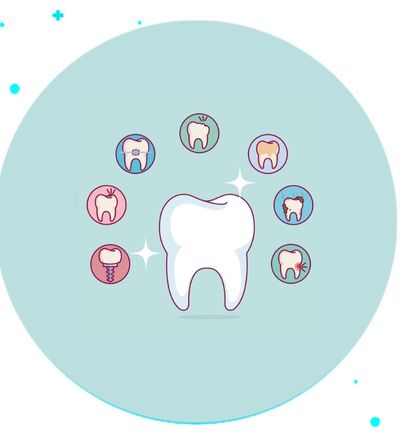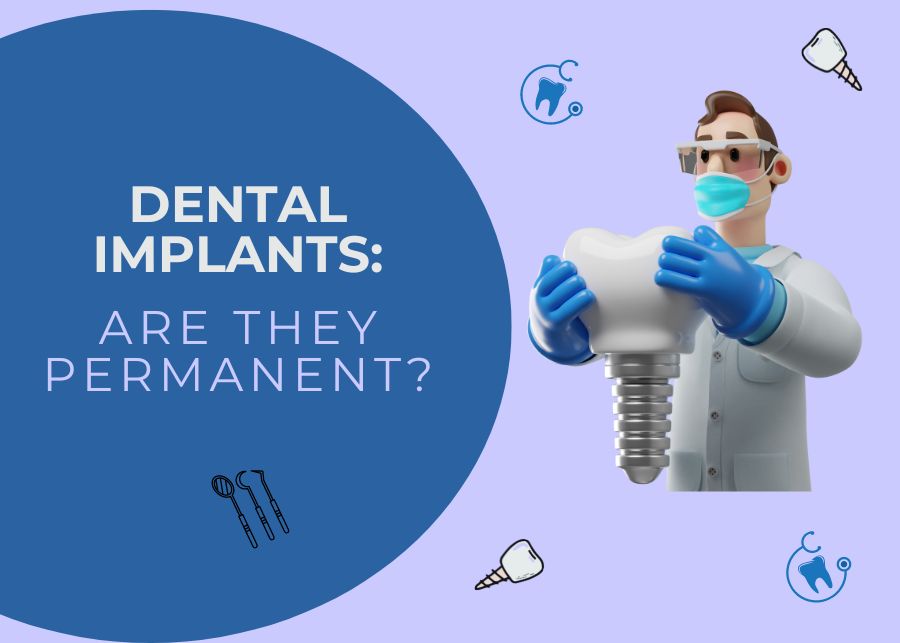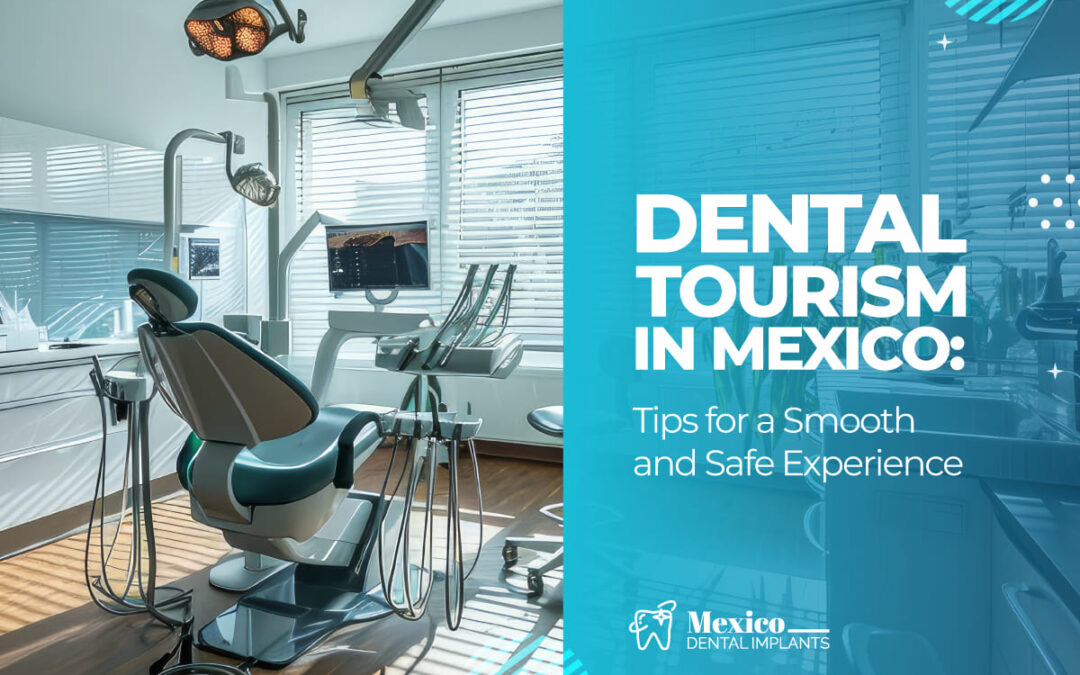February 17, 2023
Dental Implants: Are They Permanent?
Dental implants are a fantastic option when the patient suffers from tooth decay, periodontal disease, infection, injury, or any other problem related to tooth loss.
There was a time when the only treatment options available for these issues were bridges and dentures, which must be maintained with relines or replacement every few years. Luckily, dental implants were created, which meant a much healthier and long-term solution to tooth loss.
There are many benefits that come with dental implants, including rarely long-term complications, and most importantly: they are designed to be permanent.
What Are Dental Implants?
Dental implants are the go-to restorative service to replace a missing, decayed, or broken tooth. The implant itself is placed into or onto your jawbone, and it serves as an artificial tooth root. A prosthetic tooth called a crown is attached to the implant.
A dental implant is made up of three parts, which include a titanium implant post, an abutment, and a crown.
Implant – A titanium or zirconia post placed surgically in the patient’s jawbone to serve as the root of their crown.
Abutment – A piece of metal that attaches to the implant and holds the crown.
Crown– A crown is an artificial tooth attached to an abutment and offers the same appearance and function as a natural tooth.
Dental implants are designed to be permanent. However, there are factors that can contribute to implant fall. Continue reading to learn more.
How Long Do Dental Implants Last?

Generally, the dental crown will last between 10-30 years, and the titanium implant post can last forever: they interface directly with the jawbone, becoming bonded with surrounding tissue through a process known as osseointegration. Once this process is completed, the material of the implant and the surrounding bone will have fused. As a consequence, the implant can serve as an artificial tooth root.
However, the patient plays a key role in the duration of the implant, in spite of the implant’s post-high-quality and durable materials. It’s essential to maintain good oral hygiene to help the implants last forever.
We recommend you read more about Important Aftercare Tips For All-On-4 Implants here.
Why a Dental Implant May Fail?
In general, implant failure happens when something interferes with osseointegration or the healing process:




Insufficient Care and Maintenance
As we explained above, oral hygiene is key to good results. Poor oral hygiene can lead to the accumulation of plaque, and this can cause gum disease, which can damage both the patient’s gums and jawbone.
Insufficient Bone
If there’s not enough jawbone present to secure the implant in place, it’s possible for the implant to fail. A thorough examination of the jawbone will be performed before placing the implant. Bone loss over time can destabilize the implant. This can be caused by many factors, including osteoporosis, peri-implant disease (when the plaque buildup from poor oral hygiene affects the area around an implant), smoking, and other medical conditions that impact bone health.
Medical Conditions
There are many medical conditions that have been associated with dental implant failure including diabetes, osteoporosis, a weakened immune system, bleeding disorders, and cardiovascular disorders like high blood pressure, atherosclerosis, and congestive heart failure.
Teeth Grinding
Teeth grinding or any occlusal trauma can cause a fracture of the implant, fracture or loosening of the screw, or fracture of the crown’s porcelain. The movements of the implant can interfere with the osseointegration process.
Smoking
According to studies, there’s a lower dental implant success rate in people who smoke. Smoking may interfere with blood flow to the affected area, and it negatively impacts osseointegration and the healing process, not to mention smoking is also a risk factor for gum disease.
What Do I Do if an Implant Fails?

If there’s any symptom that points to a failing implant, it’s essential to see your dentist as soon as possible.
Here are some potential signs of implant failure:
-An implant that moves
-Pain
-Signs of peri-implantitis (redness, bleeding, pus, swelling, receding gums)
Benefits of Dental Implants
Prevent the Loss of Other Teeth
Dental implants stimulate the growth of new bone, which benefits your jawbone and your remaining teeth.
No Discomfort
The patient will feel no discomfort at all from having implants in the bone. This is because the titanium screw becomes a part of the bone through the osseointegration process. The bone ends up fusing with the titanium post.
Low Risk of Gum Disease
Unlike dental implants, dentures and bridges can be detrimental to oral health and its risks. They make it harder for the patient to remove food and bacteria through brushing and flossing. This may lead to poor oral hygiene which leads to gum diseases such as gingivitis or periodontitis. Dental implants can make brushing and flossing so much easier. This is because the implanted teeth feel like natural teeth, so the patient can brush and floss thoroughly.
Improve your Appearance and Confidence
Dental implants’ final result will look and feel like natural teeth. The patient will not have to worry about losing it while eating or speaking since the implant will fuse to the jawbone.
Preservation of Bone Density
Dental implants are suggested as a replacement for the missing tooth to protect the bone. After tooth loss, the bone surrounding the empty tooth socket begins to deteriorate and weaken, causing the jawbone to lose its volume and density. Inserting implants into the jawbone ensures that the bone continues to get the stimulation necessary to preserve its structure.
Help You Eat Healthier
With dentures and bridges, there is a long list of foods to avoid, including some very healthy ones like nuts, seeds, or vegetables. Dental implants do not bring any of these food restrictions, as they will recover your chewing process.
You Don’t Need Special Maintenance
Patients will not need to change their oral hygiene routine due to the structure of dental implants. Practicing oral hygiene with dental implants is easier!
Dental implants are designed to be permanent. This is because implants interface with your jawbone, becoming bonded with the surrounding bone through osseointegration.
Mexico Dental Implants offers affordable dental implants and All-On-4 in Mexico with the US’ highest standards, financing, and guarantee. Improve your life and your smile today!



